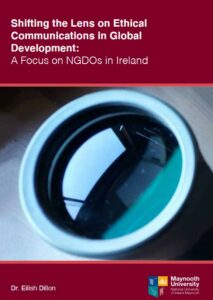Resource Title
Shifting the Lens on Ethical Communications in Global Development: A Focus on NGDOs in Ireland
Summary
This report explores critical issues around global development communications in Ireland arguing for deep and systemic transformation of the culture and practices around global development communications among NGDOs in Ireland.
Drawing on a range of interviews, it highlights issues around racism and stereotyping, the need for cultural change and transformation of the Dóchas Code of Conduct on Images and Messages.
Resource Details
Description
Concerns about the ways in which issues, peoples and places have been represented in global development (GD) communications have been raised since the 1980s.
Criticisms have been levelled at media and non-governmental development organisations (NGDOs), including for their portrayal of colonial stereotypes, ‘us’ and ‘them’ binary relationships and identities, and their use of images of people in the ‘global South’ as undignified victims who are objects of aid.
As communications are so central to all aspects of their work, NGDO representational practices can undermine their otherwise stated commitments to equality and solidarity, compromise their work in the area of public engagement, and threaten public trust leading to donor fatigue. With increasing calls for equality, diversity and inclusion (EDI) and the decolonisation of aid (Peace Direct, 2021), the question of whether NGDOs are part of the problem or the solution when it comes to their communications is coming more to the fore. To support improved communications practice in the context of these criticisms, NGDOs have developed and signed up to various codes of good practice.
The Dóchas Code on Images and Messages (Dóchas Code) which was agreed among NGDOs in Ireland in 2007, is one such voluntary code. Through signing it, organisations commit to ethical communications based on the values of dignity, equality, fairness, solidarity and justice. They also commit to a range of principles including that their images and messages would reflect these values, that people and issues related to GD would be represented in context, and that NGDOs would avoid stereotyping, ensure that people could tell their own stories, and that they would conform to the highest standards of human rights in their communications.
The ethical communications’ emphasis in the Dóchas Code is on these values and principles and what NGDOs do through their communications across organisations in relation to them. Drawing on the wider literature (see Section 1), in this report, ethical communications is understood to include how values and principles are reflected in NDGO representations of people, issues and situations, along with the practices, decision-making structures, power relations, cultures and assumptions which underpin and relate to them.
Though many NGDOs in Ireland have become signatories to the Dóchas code since 2007, and it has been hailed as an example for how others might support ethical GD communications, in recent years formal resourcing of the Dóchas Code has waned, while the communications and GD contexts have shifted rapidly. In that context, it is important to understand how NDGOs in Ireland have responded to these changes in terms of their communications, and whether the Dóchas Code is still relevant, up-to-date enough, or sufficient to support ethical communications’ practice now, many years after its introduction.
The Shifting the Lens on Ethical Communications in Global Development research report is divided into 5 sections:
1. Understanding Ethical Communications among NGDOs
2. Ethical Communications in GD – Representations, Issues and Tensions
3. Drivers of GD Communications – Constraints and Opportunities
4. Accountability and Codes of Good Practice – The Dóchas Code
5. Leadership, Learning and Decolonising GD Communications
Analysis and Conclusions
Available from:
- Download Shifting the Lens on Ethical Communications in Global Development from the Maynooth University Research Archive Library (MURAL) PDF
- Check out the Dóchas Guide to Ethical Communications, a guide launched in 2023 as a follow on from the Shifting the Lens on Ethical Communications in Global Development research report
- Check out the Illustrative Guide to the Dóchas Code of Conduct on Images and Messages PDF

